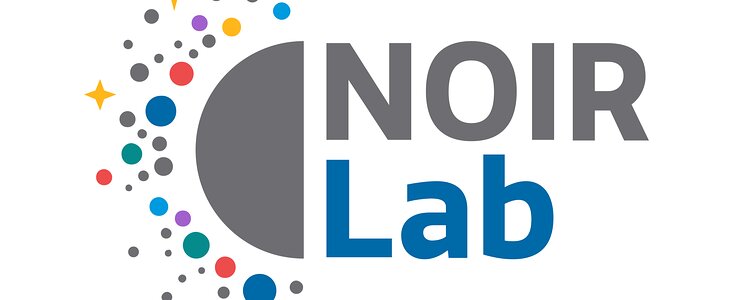Nighttime U.S. / International Astronomy Gets New Identity
NSF’s NOIRLab brings together U.S. global nighttime optical astronomy
3 April 2020
NSF’s National Optical-Infrared Astronomy Research Laboratory, which in 2019 brought together NSF’s optical and infrared nighttime astronomy under one entity, will now go by the shortened name of NSF’s NOIRLab (no-wah-lab), abbreviated from its longer formal name. NOIRLab is headquartered in Tucson, Arizona and operates Kitt Peak National Observatory, the international Gemini Observatory, the Community Science and Data Center, Cerro Tololo Inter-American Observatory, and the operations of the Vera C. Rubin Observatory.
“Our new identity is an important step in the evolution of NSF’s NOIRLab, our new organization which enables cutting-edge research in optical and infrared astronomy,” said Patrick McCarthy, NOIRLab Director. “Of course this combination of facilities and people is much bigger than just a name, but having an identity is a crucial aspect of moving forward.”
“NSF’s NOIRLab is the key to bringing together all major U.S. and international optical-infrared astronomy partners into one organization,” said Dave Boboltz, Program Director within the Division of Astronomical Sciences at the National Science Foundation, which supports the enterprise. “NOIRLab will provide world-class facilities and staff expertise that will allow researchers to explore our Universe like never before.”
NOIRLab’s new logo encapsulates key aspects of the organization: we are driven by enabling discoveries from the night sky, from a diverse, innovative and collaborative community. The designers considered how these aspects relate to NOIRLab and its programs, and how to make the words into imagery. The logo they developed has a number of meanings. The large black half-circle can represent a dark sky, the color black (noir), a planet or a black hole. The smaller objects that surround it represent community, diversity, discovery, networking, moons or stars. The five colors of the smaller circles represent the five programs within NOIRLab: the international Gemini Observatory, Kitt Peak National Observatory, Cerro Tololo Inter-American Observatory, operations of the Vera C. Rubin Observatory, and the Community Science & Data Center.
“The intention was to create a logo that is both geometric and organic. These design styles evoke certain feelings within people, from bold and innovative to friendly and inclusive,” said creative manager Pete Marenfeld of NOIRLab who led the development of the logo.
The process of bringing together the NOIRLab facilities and programs into a single organization was launched in October 2019. Through its five programs NSF’s NOIRLab serves as a focal point for community development of innovative scientific programs, the exchange of ideas, and creative development. NOIRLab’s infrastructure enables the astronomy community to advance humanity’s understanding of the Universe by exploring significant areas of astrophysics, including dark energy and dark matter, galaxies and quasars, the Milky Way, exoplanets, and small bodies in our own Solar System.
More information
NSF’s NOIRLab (National Optical-Infrared Astronomy Research Laboratory), the US center for ground-based optical-infrared astronomy, operates the international Gemini Observatory (a facility of NSF, NRC–Canada, ANID–Chile, MCTIC–Brazil, MINCyT–Argentina, and KASI–Republic of Korea), Kitt Peak National Observatory (KPNO), Cerro Tololo Inter-American Observatory (CTIO), the Community Science and Data Center (CSDC), and Vera C. Rubin Observatory (in cooperation with DOE’s SLAC National Accelerator Laboratory). It is managed by the Association of Universities for Research in Astronomy (AURA) under a cooperative agreement with NSF and is headquartered in Tucson, Arizona. The astronomical community is honored to have the opportunity to conduct astronomical research on Iolkam Du’ag (Kitt Peak) in Arizona, on Maunakea in Hawaiʻi, and on Cerro Tololo and Cerro Pachón in Chile. We recognize and acknowledge the very significant cultural role and reverence that these sites have to the Tohono O'odham Nation, to the Native Hawaiian community, and to the local communities in Chile, respectively.
Links
Contacts
Lars Lindberg Christensen
NOIRLab Head of Communications, Education & Engagement
Tel: +1 520 461 0433
Cell: +1 520 461 0433
Email: lchristensen@aura-astronomy.org


